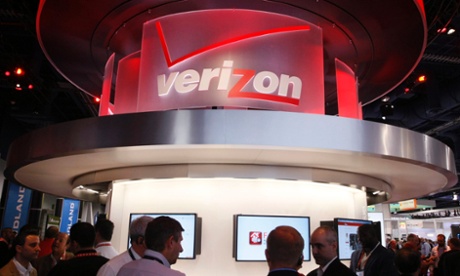But Bush and Obama makes domestic Surveillance in US just like
The old Big Brother in '1984'.
.................................................................
Reggie Walton tells the Guardian claims Foreign Intelligence Surveillance court 'is a rubber stamp [are] absolutely false'
• Revealed: NSA collecting phone records of millions of Verizon customers daily

The
Obama administration on Thursday acknowledged that it is collecting a
massive amount of telephone records from Verizon Communications.
Photograph: Rick Wilking/Reuters
The chief judge of the secretive court that granted an order permitting the US government to sweep up the phone records of millions of Verizon customers has strongly defended the panel's integrity.
In the wake of the Guardian's revelations, Reggie Walton, presiding judge of the Foreign Intelligence Surveillance Court (Fisa), said claims that the body was unduly acquiescent to the government's requests for surveillance orders were "absolutely false".
The court, which was established in 1978 and which operates out of the E Barrett Prettyman United States Courthouse near Capitol Hill, rarely provides a glimpse into its operations. Set up by Congress to act as a check on the government's broad surveillance powers, it operates in secret, with minimal public access to its deliberations or rulings. Civil libertarians have long been alarmed that it approves the vast majority of government surveillance requests.
"It is a kangaroo court with a rubber stamp," said Russell Tice, a former National Security Agency analyst.
But in a rare public statement about the court's operations, Walton rejected the charge. "The perception that the court is a rubber stamp is absolutely false," he told the Guardian.
He added: "There is a rigorous review process of applications submitted by the executive branch, spearheaded initially by five judicial branch lawyers who are national security experts and then by the judges, to ensure that the court's authorizations comport with what the applicable statutes authorize."
Charged with oversight of some of the US government's most sensitive intelligence activities, the Fisa court is a rare judicial body that does not operate in an adversarial manner. Its only petitioners come from the government. Its records are almost always classified. In its 35 years of existence, only a handful of its rulings have ever made their way into public view.
The Guardian published one of them on Wednesday. On 25 April 2013, judge Roger Vinson approved a request for the National Security Agency to collect all phone records over lines run by Verizon Business Services, including telephone numbers and call durations, on an "ongoing, daily basis". Vinson certified that the surveillance on millions of Americans, which continues until 19 July, meets legal and evidentiary standards under a provision of the Patriot Act. There is no indication in Vinson's order of any connection between the surveillance and any crime, foreign espionage or terrorist plot.
Benjamin Wittes, a Brookings Institution scholar and editor of the influential national-security blog Lawfare, was surprised by the scope of the request – and by Vinson's approval of it.
"If that constitutes relevance for purposes of Section 215 [of the Patriot Act] – or for purposes of grand jury subpoena, for that matter," Wittes wrote on Wednesday, "then isn't all data relevant to all investigations?"
Senator Jeff Merkley, an Oregon Democrat, called on the Fisa court to declassify its understanding of crucial terms of that section of the Patriot Act – such as "tangible items" that are "related to an investigation".
"We can't really propose changes to the law unless we know what the words mean as interpreted by the court," Merkley told the Guardian. "We need to have a full debate, an open debate, about what the law is, what it should be, with a full opportunity to amend it."
The Fisa court is in the habit of granting wide approval to the government. In 2012, the government requested its imprimatur for surveillance 1,856 times, an increase of 5% over its 2011 petitions. The court approved every request in both years.
Civil libertarians have long expressed alarm that the only judicial body charged with protecting Americans from undue, intrusive federal surveillance so frequently endorses the government's requests.
"Sunlight is the best disinfectant, and the problem with the Fisa court is that everything it does is under a cloak of secrecy," said retired FBI agent Mike German, who is now a lawyer with the American Civil Liberties Union. "When there's no opportunity for an adversarial argument to be made, it's easy to drift into an area that's no longer reasonable. A secret court, or a secret committee of Congress, raises the [prospect of] the type of secrecy capture where a kind of groupthink takes over."
One of the main defenses offered by government officials on Thursday to the Guardian's revelations is that all the surveillance the paper disclosed is reviewed by the Fisa court.
"The collection described with yesterday's disclosure of a purported court order is consistent with the Foreign Intelligence Surveillance Act (Fisa) as passed by Congress, executed by the executive branch, and approved by a federal court," the leaders of the House intelligence committee, Representatives Mike Rogers, a Republican, and Dutch Ruppersberger, a Democrat, said in a joint statement. "When these authorities are used, they are governed by court-approved processes and procedures. Moreover, the use of these authorities is reviewed and approved by federal judges every 90 days."
Tice, the former NSA analyst, found the Fisa court's oversight to be cold comfort. "They've had tens of thousands of requests and turned down maybe six at most," he said.
In the wake of the Guardian's revelations, Reggie Walton, presiding judge of the Foreign Intelligence Surveillance Court (Fisa), said claims that the body was unduly acquiescent to the government's requests for surveillance orders were "absolutely false".
The court, which was established in 1978 and which operates out of the E Barrett Prettyman United States Courthouse near Capitol Hill, rarely provides a glimpse into its operations. Set up by Congress to act as a check on the government's broad surveillance powers, it operates in secret, with minimal public access to its deliberations or rulings. Civil libertarians have long been alarmed that it approves the vast majority of government surveillance requests.
"It is a kangaroo court with a rubber stamp," said Russell Tice, a former National Security Agency analyst.
But in a rare public statement about the court's operations, Walton rejected the charge. "The perception that the court is a rubber stamp is absolutely false," he told the Guardian.
He added: "There is a rigorous review process of applications submitted by the executive branch, spearheaded initially by five judicial branch lawyers who are national security experts and then by the judges, to ensure that the court's authorizations comport with what the applicable statutes authorize."
Charged with oversight of some of the US government's most sensitive intelligence activities, the Fisa court is a rare judicial body that does not operate in an adversarial manner. Its only petitioners come from the government. Its records are almost always classified. In its 35 years of existence, only a handful of its rulings have ever made their way into public view.
The Guardian published one of them on Wednesday. On 25 April 2013, judge Roger Vinson approved a request for the National Security Agency to collect all phone records over lines run by Verizon Business Services, including telephone numbers and call durations, on an "ongoing, daily basis". Vinson certified that the surveillance on millions of Americans, which continues until 19 July, meets legal and evidentiary standards under a provision of the Patriot Act. There is no indication in Vinson's order of any connection between the surveillance and any crime, foreign espionage or terrorist plot.
Benjamin Wittes, a Brookings Institution scholar and editor of the influential national-security blog Lawfare, was surprised by the scope of the request – and by Vinson's approval of it.
"If that constitutes relevance for purposes of Section 215 [of the Patriot Act] – or for purposes of grand jury subpoena, for that matter," Wittes wrote on Wednesday, "then isn't all data relevant to all investigations?"
Senator Jeff Merkley, an Oregon Democrat, called on the Fisa court to declassify its understanding of crucial terms of that section of the Patriot Act – such as "tangible items" that are "related to an investigation".
"We can't really propose changes to the law unless we know what the words mean as interpreted by the court," Merkley told the Guardian. "We need to have a full debate, an open debate, about what the law is, what it should be, with a full opportunity to amend it."
The Fisa court is in the habit of granting wide approval to the government. In 2012, the government requested its imprimatur for surveillance 1,856 times, an increase of 5% over its 2011 petitions. The court approved every request in both years.
Civil libertarians have long expressed alarm that the only judicial body charged with protecting Americans from undue, intrusive federal surveillance so frequently endorses the government's requests.
"Sunlight is the best disinfectant, and the problem with the Fisa court is that everything it does is under a cloak of secrecy," said retired FBI agent Mike German, who is now a lawyer with the American Civil Liberties Union. "When there's no opportunity for an adversarial argument to be made, it's easy to drift into an area that's no longer reasonable. A secret court, or a secret committee of Congress, raises the [prospect of] the type of secrecy capture where a kind of groupthink takes over."
One of the main defenses offered by government officials on Thursday to the Guardian's revelations is that all the surveillance the paper disclosed is reviewed by the Fisa court.
"The collection described with yesterday's disclosure of a purported court order is consistent with the Foreign Intelligence Surveillance Act (Fisa) as passed by Congress, executed by the executive branch, and approved by a federal court," the leaders of the House intelligence committee, Representatives Mike Rogers, a Republican, and Dutch Ruppersberger, a Democrat, said in a joint statement. "When these authorities are used, they are governed by court-approved processes and procedures. Moreover, the use of these authorities is reviewed and approved by federal judges every 90 days."
Tice, the former NSA analyst, found the Fisa court's oversight to be cold comfort. "They've had tens of thousands of requests and turned down maybe six at most," he said.
.......................................................................
美秘密收集Verizon客戶紀錄
06 - 07 00:03
|
 |
(綜合報道)(星島日報報道)美國國土安全局現時引用法庭今年四月一道秘密命令,每天搜集流動通訊服務商Verizon客戶通話和通訊紀錄,估計受
影響客戶達數以百萬計。他們在毫不知情的情況下,被取走通話資料。雖然當局收集並不包括通話或通訊內容,但事件曝光後,仍引起輿論批評有侵犯私隱之嫌。
英國《衛報》周四報道,該報記者取得那道法庭秘密命令的副本,顯示Verizon「持續每天」向國土安全部提交其系統內的客戶通話和通訊資料,包括在美國境內、或者美國與其他國家之間的通話和通訊資料。
該報指出,美國早於一九七八年通過對外情報監視法案(Fisa),並設立Fisa秘密法庭。該法庭四月二十五日頒布命令給聯邦調查局,授權美國政府可以不受限地向Verizon取得那些資料,為期三個月,直至今年七月十九日。
Verizon要向國土安全部提交通話雙方的電話號碼、通話開始和結束時間等資枓,但不包括通話或通訊內容。
雖然不涉及內容,但執法人員從那些資料,大概了解通話人士之間的關係,用甚麼方式接觸,以及甚麼地點接觸。這份文件首次顯示奧巴馬政府任意收集數以百萬計美國公民通話紀錄,不管通話人士是否被懷疑觸犯法例。
英國《衛報》周四報道,該報記者取得那道法庭秘密命令的副本,顯示Verizon「持續每天」向國土安全部提交其系統內的客戶通話和通訊資料,包括在美國境內、或者美國與其他國家之間的通話和通訊資料。
該報指出,美國早於一九七八年通過對外情報監視法案(Fisa),並設立Fisa秘密法庭。該法庭四月二十五日頒布命令給聯邦調查局,授權美國政府可以不受限地向Verizon取得那些資料,為期三個月,直至今年七月十九日。
Verizon要向國土安全部提交通話雙方的電話號碼、通話開始和結束時間等資枓,但不包括通話或通訊內容。
雖然不涉及內容,但執法人員從那些資料,大概了解通話人士之間的關係,用甚麼方式接觸,以及甚麼地點接觸。這份文件首次顯示奧巴馬政府任意收集數以百萬計美國公民通話紀錄,不管通話人士是否被懷疑觸犯法例。

